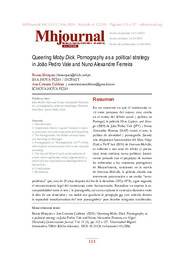Resumen :
En un momento en que el matrimonio civil entre personas del mismo sexo estaba
en el centro del debate social y político en
Portugal, la película Hero, Captain, and Stranger (2009) de João Pedro Vale (JPV) y Nuno
Alexandre Ferreira (NAF) cruzó el arte, la
política de identidad y pornografía. Siendo
una adaptación homoerótica del libro MobyDick; o The Whale (1851) de Herman Melville,
se enfrenta a una serie de tabúes (y prejuicios) tanto estéticos como políticos. Inicialmente pensada con el propósito de rastrear
las referencias a los marineros portugueses
de Massachusetts, constantes en la novela
de Herman Melville, la película aborda una
irreverente provocación a un medio “semiperiférico” que, más de 35 años después del fin de la dictadura (1926-1974), sigue negando
el reconocimiento legal del matrimonio entre homosexuales. Basándose en superar la incompatibilidad entre el arte y la pornografía, así como explorar la conexión distintiva entre
la idea de eros democrático y un modelo más igualitario de pornografía gay, este artículo destaca
la capacidad transformadora del ‘arte pornográfico’ para desafiar categorías establecidas.
As same sex marriage emerged at centre
of the social and political debate in Portugal, the film Hero, Captain, and Stranger
(2009), by João Pedro Vale (JPV) and
Nuno Alexandre Ferreira (NAF), intersected art, identity politics and pornography in a manner hitherto unseen in
Portugal. A homoerotic adaptation of
Herman Melville’s 1851 novel Moby-Dick;
or, The Whale, the film confronts a series
of aesthetical and political taboos (and
prejudices) which have never been analysed in depth despite their topicality. Initially conceived to survey the references to
Portuguese seaman from Massachusetts
in Herman Melville’s novel, the project by JPV and NAF is an irreverent provocation to
a ‘semi-peripheral’ milieu, which still denied juridical recognition of homosexual marriage
thirty-five years after the demise of the dictatorial regime (1926-1974). Basing itself on
overcoming the incompatibility between art and pornography, as well as exploring the distinctive connection between the idea of democratic eros and a more egalitarian model of gay pornography, this article highlights the transformative capacity of ‘pornographic art’ to challenge
established categories. It unveils a nuanced landscape that encourages a reevaluation of
societal norms and moral dichotomies, ultimately facilitating a more inclusive and expansive
comprehension of human desire.
|
 La licencia se describe como: Atribución-NonComercial-NoDerivada 4.0 Internacional.
La licencia se describe como: Atribución-NonComercial-NoDerivada 4.0 Internacional.
.png)
